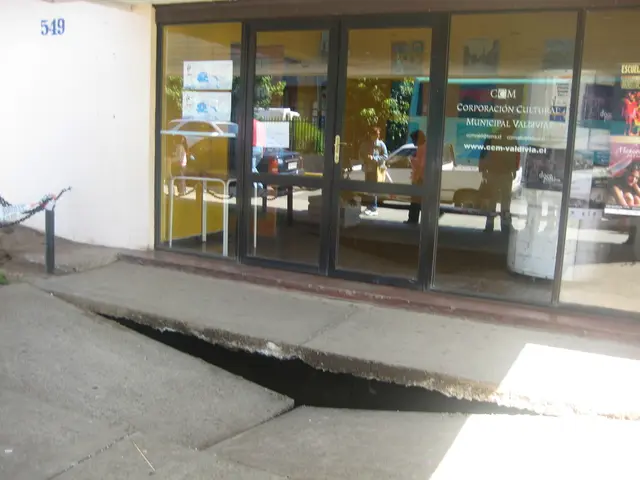Call for Advanced Tech in Border Control: Police Union Sounds the Alarm
Border Enforcement Demands Enhanced Technological Tools by Law Enforcement Association - Enhanced Technical Resources for Border Control: Police Union Advocates for Upgrade
In a pointed announcement, union head Roßkopf called out for more advanced tech to beef up Germany's border security.He's talking about high-tech gear such as drones, mobile command posts with state-of-the-art license plate recognition systems, gadgets for spotting people in vehicles, and top-notch surveillance of what he refers to as the "green border."
"We've been carrying a massive overtime burden," Roßkopf warns, "and if it doesn't get lightened soon, we risk reaching a critical point, leading to manpower deficits at train stations, airports, or other key areas."
He argues that relying solely on manpower isn't sustainable in the long run, with bustling borders proving too much for officers to handle without a technological boost.
The federal police have already been testing this tech since 2018, according to Roßkopf, but even though they've found it effective, they're yet to acquire it. Germany seems to be playing catch-up, as other European countries, like the Netherlands and Romania, are miles ahead in this department.
Roßkopf also underlines the importance of strategies that help manage and lessen immigration. "But the question remains, for how long can we sustain these extraordinary police performances?"
Additionally, Roßkopf expects major repercussions on cross-border traffic, including potential delays for travelers due to the stepped-up checks.
These changes follow Interior Minister Alexander Dobrindt's announcement of tighter border control measures to curb immigration. With more police officers patrolling the borders, asylum seekers may face rejection at the border.
Despite the potential disruptions to daily commutes and freight traffic, Dobrindt emphasized that minimizing the impact on commuters and border workers remains a priority.
- Police Union
- Border Control
- Germany
- Technology
- Federal Police
- Augsburger Allgemeine
- Asylum Seekers
Background
Due to restrictions on access to up-to-date information about the German Federal Police's acquisition of specific border control technologies, such as drones and vehicle detection devices, published reports primarily focus on policy and personnel measures to tighten border controls rather than detailed technological deployments.
Key points about the German Federal Police's border control status as of May 2025:
- The new government under Chancellor Friedrich Merz and Interior Minister Alexander Dobrindt have prioritized limited immigration and increased asylum seeker rejections at the border[1][2][3]
- The new strategy involves deploying more police officers at the borders to conduct stricter identity checks and possibly "push-back" some asylum-seekers, with the aim of gradually lessening migration demands[1][2][3]
- No specific mentions of recent acquisitions or operational deployment of drones, mobile control points, or vehicle detection technologies by the German Federal Police for border control can be found in official public accounts[1][2][3][5]
- The focus remains largely on increasing manpower and enforcing stricter controls and rejections rather than on new technological tools or equipment in publicly available accounts of the border control policy[1][2][3]
- EU and German border agencies have noted a decrease in illegal border crossings and asylum applications overall in 2024 compared to previous years, possibly reflecting broader migration trends but without directly linking changes to new tech usage at the borders[5]
In conclusion, while Germany is ramping up border control efforts with more personnel and stricter enforcement under the new government, there is no current evidence of recent drone, mobile control point, or vehicle detection device acquisitions or operational deployments by the German Federal Police for border control as of early May 2025. The focus remains mostly on policy and personnel measures at the borders.
- The Police Union in Germany has expressed a keen interest in the acquisition and deployment of advanced technological solutions for border control, such as drones, mobile command posts, and vehicle detection devices.
- Despite the federal police having tested this technology since 2018, their acquisition remains pending, with Germany seemingly lagging behind countries like the Netherlands and Romania in this regard.
- In light of the increased manpower at the borders and stricter identity checks, asylum seekers may face rejections at the border due to the tighter border control measures announced by Interior Minister Alexander Dobrindt.
- The general news outlet, Augsburger Allgemeine, has reported on the policy changes, but detailed information about the tech acquisitions and operational deployments by the German Federal Police is sparse in their coverage.
- EU and German border agencies have noticed a decrease in illegal border crossings and asylum applications overall in 2024, though it is unclear if this is directly linked to the use of new technological tools at the borders.








